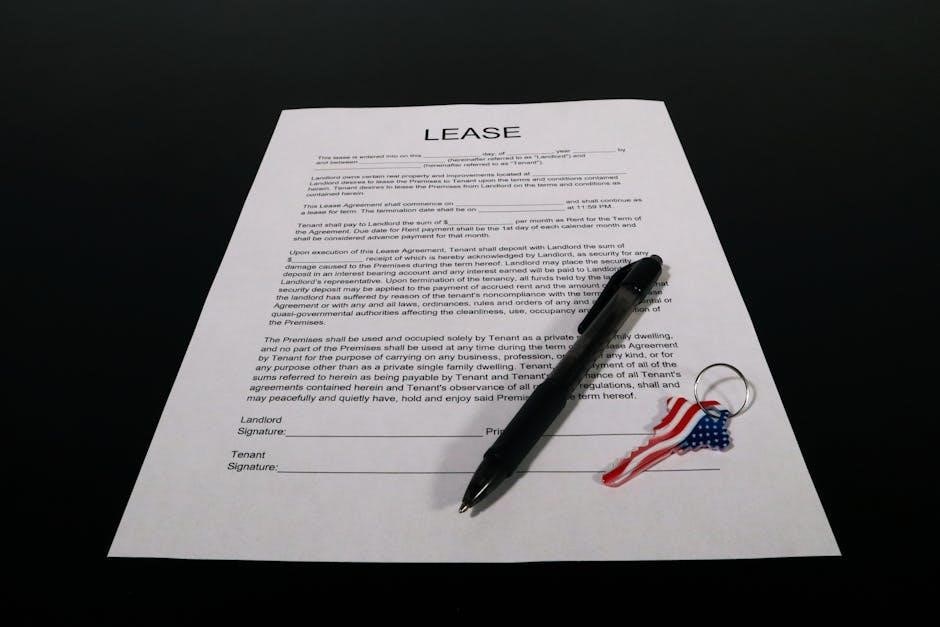
tenants bc rental application pdf
The BC Rental Application Form is a crucial document for tenants and landlords in British Columbia. It streamlines the tenant screening process by collecting personal, rental, and financial details, ensuring informed decisions and fostering trust.
1.1 Overview of the Process
The BC rental application process is designed to streamline tenant screening and ensure a fair evaluation of potential renters. It begins with obtaining the official rental application form, which is standardized across British Columbia. Tenants are required to provide detailed personal, rental, and financial information to help landlords assess their suitability. The process typically involves filling out the form accurately, attaching necessary supporting documents, and submitting it for review. This step-by-step approach ensures transparency and fairness for both parties. Landlords use the information to evaluate creditworthiness, rental history, and employment stability, while tenants demonstrate their reliability. The process is straightforward and uniform, making it easier for tenants to apply for rental properties confidently. By following this structured method, both landlords and tenants can navigate the rental application process efficiently and respectfully.
Key to this process is the accuracy and completeness of the information provided, as it forms the basis for rental decisions. Tenants are encouraged to review the form carefully before submission to avoid delays. The BC rental application process is a foundational step in securing a rental property and is widely recognized as a standard practice in the province.
1.2 Importance of the Application Form
The BC Rental Application Form is a critical tool for both tenants and landlords, serving as the foundation for a fair and transparent rental process. It ensures that landlords can thoroughly assess potential tenants by gathering essential information about their personal, financial, and rental history. This standardized document protects both parties by providing a clear and consistent framework for evaluation. For tenants, it offers an opportunity to demonstrate their reliability and trustworthiness. For landlords, it helps mitigate risks by providing insights into an applicant’s creditworthiness and rental behavior. The form also promotes accountability and clarity, reducing the likelihood of disputes. By requiring detailed and accurate information, it ensures that rental decisions are based on objective criteria, fostering a professional and respectful tenancy relationship. The BC Rental Application Form is not just a formality; it is a vital step in securing a rental property and building a positive landlord-tenant relationship.
1.3 Benefits for Tenants and Landlords
The BC Rental Application Form offers numerous benefits for both tenants and landlords, ensuring a streamlined and fair rental process. For tenants, it provides a structured way to present their personal, financial, and rental history, helping them stand out as reliable candidates. This transparency can increase their chances of securing a rental property. For landlords, the form simplifies the screening process by providing a standardized format to evaluate applicants, reducing the risk of discrimination or bias. It also helps landlords verify the credibility of potential tenants, ensuring a more secure and informed rental decision. Additionally, the form fosters trust and accountability between both parties, creating a foundation for a positive landlord-tenant relationship. By ensuring all necessary information is collected upfront, it saves time and reduces the likelihood of disputes, benefiting everyone involved in the rental process.

Key Sections of the BC Rental Application Form
The BC Rental Application Form includes essential sections like personal information, rental history, employment details, financial data, and references, ensuring a comprehensive evaluation of potential tenants.
2.1 Personal Information
The Personal Information section of the BC Rental Application Form requires applicants to provide essential details about themselves. This includes their full name, date of birth, contact information, and current address. Applicants may also need to list emergency contacts and provide identification details, such as a driver’s license or passport number. Additionally, some forms may ask for marital status or the number of dependents. This section helps landlords verify the applicant’s identity and assess their reliability as a tenant. Accurate and complete information is crucial, as any discrepancies could lead to delays or rejection of the application. By providing clear and truthful personal details, applicants demonstrate transparency and responsibility, which are key factors in the rental approval process.
2.2 Rental History
The Rental History section of the BC Rental Application Form requires applicants to provide detailed information about their past tenancies. This includes the names and contact details of previous landlords, the addresses of rental properties, dates of tenancy, and monthly rent amounts. Applicants may also be asked to explain any gaps in their rental history or provide reasons for moving. This section is critical for landlords to assess the applicant’s reliability and rental behavior. Honest and accurate disclosure is essential, as false information can lead to application rejection. By reviewing rental history, landlords can evaluate an applicant’s ability to meet lease obligations and maintain a positive tenant-landlord relationship. A consistent and positive rental history significantly strengthens an applicant’s chances of approval. This section ensures both parties enter an agreement with mutual confidence and understanding.
2.3 Employment Information
The Employment Information section of the BC Rental Application Form requires applicants to provide details about their current and past employment. This includes their job title, employer’s name and contact information, length of employment, and monthly income. Applicants may also be asked to explain gaps in employment or provide additional context for frequent job changes. For self-employed individuals, proof of income through tax returns or financial statements may be required. This section helps landlords assess the applicant’s financial stability and ability to pay rent consistently. Accurate and detailed employment information is crucial, as it directly impacts the landlord’s decision-making process. By verifying employment details, landlords can ensure that the applicant has a reliable income source to meet rental obligations. This section plays a key role in evaluating the applicant’s financial responsibility and long-term tenancy potential.
2.4 Financial Information
The Financial Information section of the BC Rental Application Form is designed to assess an applicant’s economic stability and ability to afford rent. Applicants are typically required to disclose their monthly income sources, including employment income, self-employment earnings, or other regular payments like investments or government benefits. They may also need to provide proof of income, such as recent pay stubs, bank statements, or tax returns. Additionally, applicants may be asked to list their assets, such as savings accounts, investments, or property, as well as any outstanding debts or financial obligations. This information helps landlords evaluate the applicant’s financial health and determine their likelihood of meeting rental payments consistently. By providing a comprehensive overview of their financial situation, applicants can demonstrate their reliability as tenants. This section is crucial for landlords to make informed decisions about approving or denying a rental application.
2.5 References
The References section of the BC Rental Application Form is essential for landlords to verify the credibility and reliability of potential tenants. Applicants are typically required to provide contact information for professional and personal references. These may include previous landlords, employers, or other individuals who can vouch for the applicant’s character and rental history. It is important to provide accurate and up-to-date contact details to avoid delays in the application process; Landlords often use these references to assess the applicant’s track record of meeting rental obligations and maintaining a positive relationship with previous landlords. Additionally, employment references can confirm income stability, while personal references may speak to the applicant’s trustworthiness. Ensuring that all references are relevant and reliable strengthens the applicant’s case and increases their chances of approval. This step is a critical part of the tenant screening process.

The Application Process
The BC Rental Application Process involves obtaining and completing the form, submitting required documents, and reviewing landlord-tenant laws. Accuracy and transparency are key to a smooth experience.
3.1 How to Obtain the BC Rental Application Form
Obtaining the BC Rental Application Form is straightforward. Tenants can download it from the official British Columbia government website or through platforms like DocHub and Lumin. Additionally, real estate associations and property management companies often provide this form. Landlords may also supply it directly; Ensure the form is up-to-date and complies with current rental laws. The form is typically available in PDF format, enabling easy downloading and printing. Some versions are fillable online, saving time; Always verify the form’s authenticity to avoid outdated or incorrect versions. Once obtained, review the form carefully and gather all required documents before filling it out. This ensures a smooth and efficient application process.
3.2 Steps to Fill Out the Form Accurately

Filling out the BC Rental Application Form requires attention to detail to ensure accuracy. Start by carefully reviewing each section to understand what information is required. Begin with personal details, such as full name, contact information, and BC residency status. Next, provide a complete rental history, including previous addresses and landlord references. Accurately list employment information, including job titles, durations, and employer contact details. Financial details, such as monthly income and bank account information, must be filled out truthfully. Include at least two professional or personal references. Double-check all entries for spelling and numerical errors. Attach required supporting documents, like pay stubs or proof of employment, to avoid delays. Finally, review the entire form to ensure all sections are completed and sign it before submission. Honesty and thoroughness are crucial to avoid rejection or legal issues.
3.3 Required Supporting Documents
When submitting a BC Rental Application, tenants are typically required to provide specific supporting documents to verify the information provided. These may include proof of identity, such as a valid government-issued ID or passport. Recent pay stubs, employment letters, or tax returns are often needed to confirm income stability. Bank statements or proof of savings can also be requested to assess financial standing. A rental history verification document, signed by previous landlords, is commonly required to evaluate past tenancy behavior. Additionally, applicants may need to provide references, either professional or personal, to vouch for their reliability. In some cases, a co-signer or guarantor may be required, especially for applicants with limited credit history. Ensuring all documents are up-to-date, legible, and accurately reflect the information on the application is essential for a smooth approval process.

3.4 Submitting the Application

Once the BC Rental Application Form is completed and all required documents are gathered, the next step is to submit it to the landlord or property manager. Applications can typically be submitted via email, fax, or in person, depending on the landlord’s preference. It’s important to follow the submission instructions carefully to ensure timely processing. Before submitting, double-check that all sections are filled out accurately and that all supporting documents are included. Incomplete applications may delay the approval process or result in rejection. After submission, it’s a good idea to keep a copy of the application and supporting documents for personal records. Tenants may also want to follow up with the landlord to confirm receipt and inquire about the expected timeline for a decision. Prompt and professional submission can enhance the chances of a positive outcome.

Legal Considerations
Understanding BC rental laws is essential for both tenants and landlords. Key considerations include proper rent increase notifications, eviction procedures, and ensuring compliance with the Residential Tenancy Act to avoid disputes.
4.1 BC Rental Laws and Regulations
British Columbia rental laws are governed by the Residential Tenancy Act (RTA) and regulated by the Residential Tenancy Branch (RTB). These laws provide a framework for rental agreements, ensuring fairness for both tenants and landlords. Key aspects include rules for rent increases, eviction notices, and tenant rights; Landlords must use approved forms, such as RTB-7 for rent increases, to maintain compliance. Tenants are protected from unlawful evictions and retaliatory actions. The laws also outline prohibited questions on rental applications, ensuring non-discrimination. Understanding these regulations is crucial for navigating the rental process effectively and avoiding legal disputes. Both parties should familiarize themselves with the RTA to ensure their actions align with provincial requirements. Compliance with these laws helps maintain a balanced and respectful landlord-tenant relationship in British Columbia.
4.2 Prohibited Questions on Rental Applications
Under BC rental laws, certain questions are prohibited on rental applications to ensure fairness and prevent discrimination. Landlords cannot inquire about a tenant’s marital status, number of children, or personal characteristics protected under human rights legislation. Questions about income sources, such as government assistance or child support, are also restricted. Additionally, landlords cannot ask for sensitive personal information unrelated to the tenancy, such as medical history or citizenship status. These restrictions aim to promote equality and prevent unlawful discrimination. Tenants have the right to withhold prohibited information, and landlords who include such questions may face legal consequences. Understanding these guidelines ensures that rental applications remain compliant with the Residential Tenancy Act and respect tenants’ rights. This framework helps maintain a fair and transparent rental process in British Columbia.

Tips for Tenants
Tenants should thoroughly complete the BC Rental Application, ensuring accuracy and honesty. Presenting themselves as ideal candidates helps in a competitive market and avoids future disputes.
5.1 How to Complete the Application Effectively
To complete the BC Rental Application effectively, tenants should ensure all sections are filled out thoroughly and honestly. Providing accurate personal, rental, and financial information is crucial. Tenants should highlight their stability and reliability by including detailed rental history, employment verification, and strong references. It’s important to disclose any past issues, such as evictions or credit problems, and explain them clearly to avoid misunderstandings. Supporting documents like pay stubs, bank statements, and identification should be attached to strengthen the application. Tenants should also review the form for errors or omissions before submission. Being transparent and organized demonstrates responsibility and increases the likelihood of approval. Additionally, understanding the legal requirements and rights as a tenant can help navigate the process confidently.
- Be honest and transparent in all details.
- Provide complete rental and employment history.
- Include valid references and supporting documents.
- Review the application for accuracy before submission.
5.2 Addressing Bad Credit or Rental History
If you have bad credit or a problematic rental history, it’s important to address these issues proactively. Transparency is key to building trust with landlords. Consider explaining the circumstances in a brief statement or letter attached to your application. Highlighting positive aspects, such as consistent employment, increased income, or efforts to improve your financial situation, can help mitigate concerns. If possible, offer additional assurances like a co-signer or a larger security deposit. Providing strong references from previous landlords or employers can also demonstrate your reliability. Be honest about past issues, as misrepresentation can lead to application rejection. By addressing these challenges directly, you can show responsibility and increase your chances of approval. Remember, landlords appreciate candor and may be willing to work with you if they see genuine effort to improve your financial standing.
- Be transparent about past issues.
- Provide explanations or supporting documents.
- Highlight positive changes or improvements.
- Offer additional assurances if needed.
5.3 Knowing Your Rights as a Tenant
Understanding your rights as a tenant is essential when completing a BC rental application. The Residential Tenancy Act in British Columbia protects tenants from unfair practices, ensuring landlords follow legal guidelines. Key rights include protection against illegal questions on rental applications and restrictions on rent increases. Landlords must use approved forms for rent increases and cannot discriminate based on race, gender, or other protected characteristics. Tenants also have the right to privacy and must receive proper notice before the landlord enters the rental unit. Familiarizing yourself with these rights helps you navigate the application process confidently and ensures you are treated fairly. For more information, visit the Residential Tenancy Branch (RTB) website or consult official BC rental resources.
- Protection against illegal questions on applications.
- Restrictions on rent increases and required notices.
- Right to privacy and proper notice for entry.
- Protections against discrimination.

Additional Resources
Access official BC rental forms, third-party templates, and online tools for editing and e-signing. Visit the Residential Tenancy Branch (RTB) website or platforms like DocHub for convenient solutions.
6.1 Official BC Rental Application Forms
Official BC rental application forms are essential for a streamlined tenancy process. The Residential Tenancy Branch (RTB) provides standardized forms like RTB-1 (Residential Tenancy Agreement) and RTB-5 (Manufactured Home Site Tenancy Agreement). These documents ensure compliance with BC rental laws and regulations. Tenants and landlords can access these forms on the RTB website or through Service BC offices. They are available in PDF format, making it easy to download and print. Using official forms helps maintain clarity and fairness in the rental process. They cover all necessary details, from rent payments to property conditions, ensuring both parties understand their responsibilities. Always verify the forms are up-to-date, as they are periodically updated to reflect changes in rental laws. Official forms are a reliable and legally sound choice for rental applications in British Columbia.
6.2 Third-Party Templates and Guides
Third-party templates and guides offer flexible solutions for creating BC rental applications. Platforms like DocHub and Lumin provide editable templates that can be customized to suit specific needs. These tools often include features like electronic signatures and online editing, making the application process more efficient. Additionally, guides from organizations like LandlordBC offer tips on how to fill out the forms accurately. These resources are particularly useful for tenants who want to ensure their application is professional and complete. Many third-party templates are free or low-cost, making them accessible to a wide range of users. They also cater to different types of rentals, such as manufactured homes or residential properties. By using these templates, tenants can present themselves in the best light, increasing their chances of securing the rental property they desire.
6.3 Online Tools for Editing and E-Signing

Online tools like DocHub and Lumin simplify the process of editing and e-signing BC rental applications. These platforms allow users to easily fill out forms, add electronic signatures, and share documents digitally. DocHub offers a user-friendly interface for editing PDFs, while Lumin provides advanced features for customizing templates. Such tools are particularly useful for tenants who need to submit applications quickly and efficiently. They also enable landlords to review and approve applications remotely, reducing paperwork and saving time. Many of these tools are accessible online, requiring no software downloads, and offer secure storage options for sensitive documents. By utilizing these platforms, both tenants and landlords can streamline the rental application process, ensuring accuracy and convenience. These tools are increasingly popular due to their ease of use and ability to facilitate seamless communication between all parties involved.
The BC Rental Application Form is an essential tool for both tenants and landlords in British Columbia, providing a structured approach to the rental process. By gathering comprehensive information, it helps landlords assess potential tenants while ensuring transparency and fairness. Tenants benefit from a clear understanding of what is required, enabling them to present themselves effectively. The form also aligns with provincial regulations, ensuring compliance with rental laws. With the availability of online tools and resources, the process of completing and submitting the application has become more efficient. Whether you’re a tenant seeking housing or a landlord managing properties, the BC Rental Application Form plays a vital role in establishing a mutually beneficial tenancy agreement. Its importance cannot be overstated, as it lays the foundation for a smooth and legally sound rental experience in British Columbia.